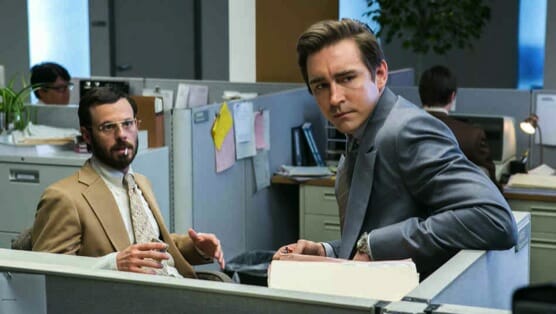
First thing’s first—Halt & Catch Fire is a horrible title. Like, Cougartown/Trophy Wife-level bad (though, admittedly, those are all still infinitely better than $#*! My Dad Says).
According to the opening text, the titular phrase refers to “an early computer command that sent the machine into a race condition, forcing all instructions to compete for superiority at once.” Once entered, this command assures that “control of the computer could not be regained.” It’s an apt enough metaphor since it appears the show will be dealing with the 1980s computer boom as seen through the eyes of a group of Texas-based innovators. I say “appears” because, when all is said and done, “I/O” doesn’t quite give its audience a sense of where the series is going or what kind of show it aspires to be.
There is, of course, the obvious comparison—it’s a 1980s version of AMC’s flagship show, Mad Men. Only while Mad Men delved into the slick, sexy world of advertising in 1960s New York City, Halt & Catch Fire embeds itself in the significantly less appealing world of 1980s Dallas and centers on an industry where people spent long periods of time staring at screens and fiddling with primitive technology. Such a logline is, no doubt, a difficult sell and it’s to AMC’s credit that they have chosen to be the carrier for what initially appears like a horribly niche concept.
In bringing the difficult subject matter to life, creators Christopher Cantwell and Christopher C. Rogers have humanized the world by employing a ragtag group of unlikely acquaintances as their central characters. At the forefront is Joe McMillan (Lee Pace), a classically handsome, silver-tongued salesman with questionable morals. Sort of like the classically handsome, silver-tongued salesman with questionable morals from that other AMC show. All kidding aside, the parallels between Joe and Don Draper are unavoidable. Whereas Mad Men’s pilot used Don’s inherent charisma to smooth over his more loathsome qualities, however, “I/O” too often shines an unflattering light on its main character’s worst tendencies, whether it be his abrasive, condescending attitude or generally smug demeanor.
As established by the latter half of the pilot, Joe is, first and foremost, a wannabe visionary looking to be a pioneering figure in the PC game. A former employee of IBM, he now wishes to push Dallas tech company, Cardiff Electronics, on the path to developing a cheaper, more effective alternative to the IBM brand that has monopolized the market—even if it means bringing the company kicking and screaming into the arrangement.
Joining Joe in his venture is fellow Cardiff Electronics employee and hapless computer nerd Gordon Clarke (Scoot McNairy). We know he’s a hapless nerd because, in one scene, he drops a bit of food on the ground only to pick it up and, after a rudimentary cleansing, put it back in his mouth. Rounding out the team is Cameron Howe (Mackenzie Davis), a tomboyish computer prodigy who Joe hooks up with in the first act and then recruits in the final act. Indeed, despite the show’s aspirations for prestige-level drama, many of its main characters come across as little more than slightly-nuanced stock characters.
That’s not to say the show’s actors don’t do a phenomenal job at bringing the roles to life. As Joe, Pace makes a complete 180-degree turn from his last major TV role, the flustered Pie Maker in Bryan Fuller’s Pushing Daisies. Likewise, despite the heavy beard that covers most of his face, Scoot McNairy manages to capture Gordon’s sadness as well as his fiery passion, once again demonstrating why he’s likely to go down as one of this generation’s finest character actors. Most of the pilot centers on the Joe and Gordon’s interactions and Pace and McNairy really sell the odd couple dynamic. Perhaps the best scene of the episode is a lengthy montage wherein the two attempt to reserve-engineer an IBM PC. As the hours and days drag on, it’s hard not to be charmed by the two’s natural chemistry or their excitable reactions when they make a big breakthrough.
As Cameron, Davis brings a vibrant energy to her limited screen time but, again, her character is restricted mostly to the very beginning and very end of the episode. Faring much better is Kerry Bishé as Gordon’s wife, Donna. While, at first, I feared certain groups would inevitably lump Donna in with Skyler White and Betty Draper in the “Nagging Cable Wives club,” the pilot actually offers refreshing hints that the character will be more than simply an obstacle to her husband’s potential success.
All things considered, “I/O” ends up feeling less like a fully fleshed-out pilot episode than the expanded first half of one. As such, it’s hard to get a definite beat on this inaugural entry without the benefit of subsequent installments to color inside the lines. Only time will tell whether this show can truly forge its own path to artistic success or, much like the hypothetical PC product at its center, it will merely serve as a polished re-interpretation of what has worked before.
Mark Rozeman is a Los Angeles-based freelance writer and regular contributor to Paste. You can follow him on Twitter.